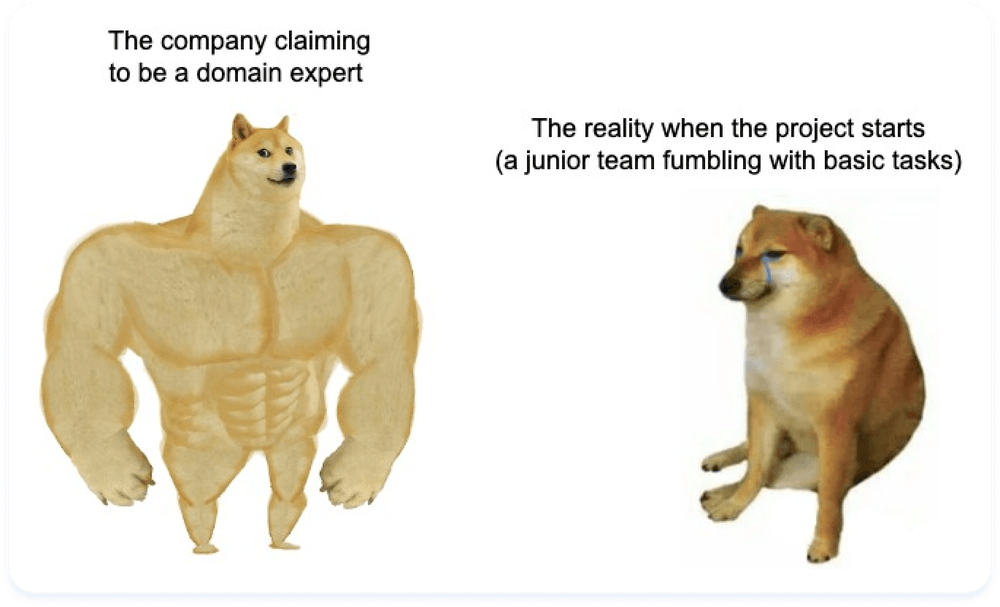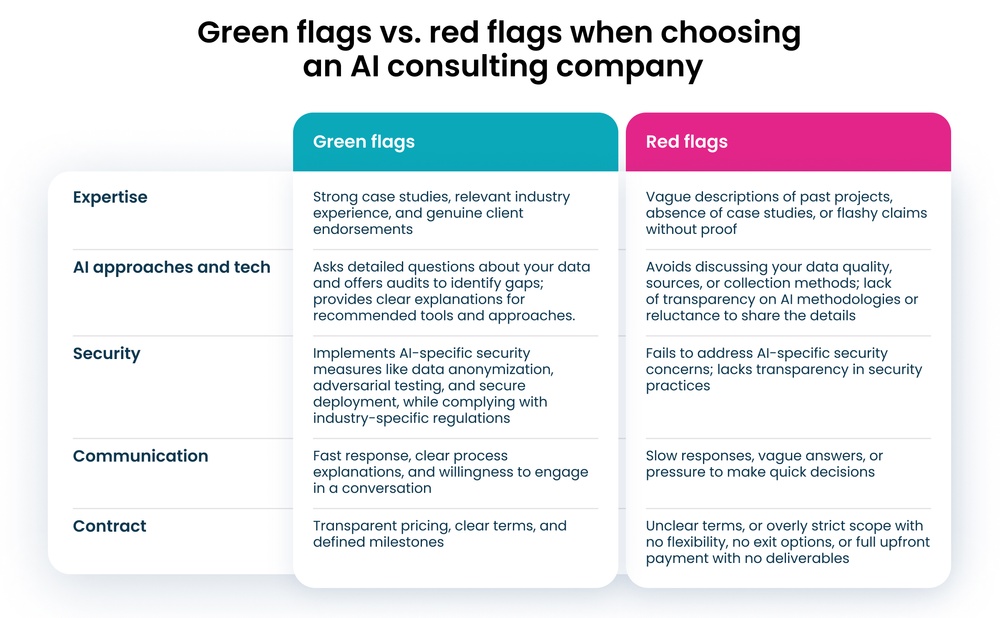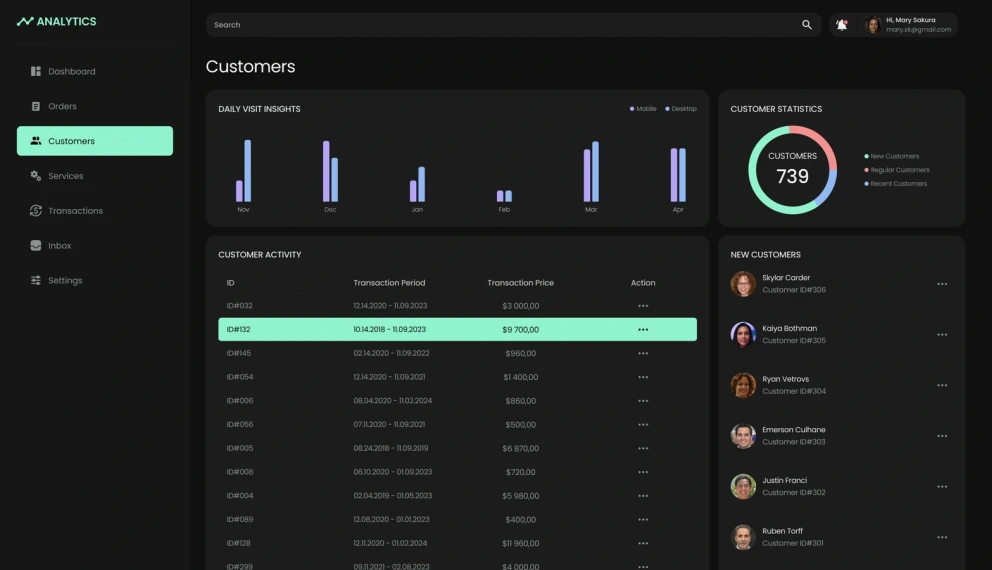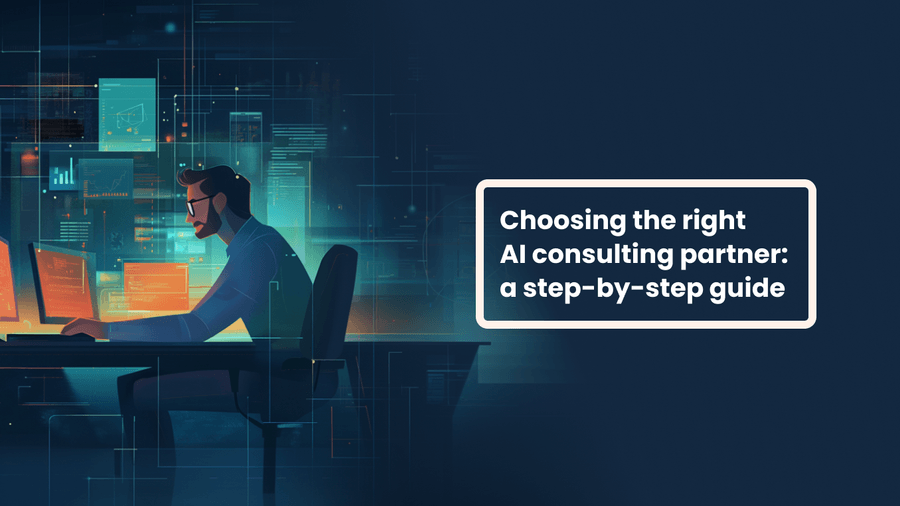If you’re still wondering whether AI is firmly here, here are some fresh numbers that might clear things up:
- 72% of companies now use AI in at least one area of their business.
- 9 out of 10 companies see AI as a way to stay ahead of the competition.
- And for 83% of businesses, weaving AI into their strategy is a major goal.
So, with AI already taking root in most businesses, the real question isn’t if it should be adopted — it’s how to approach this process. The journey always begins with consulting, and we’re here to help you find the right partner to make that conversation happen for your big plans.
Clear goals – stepping stones to a successful project
Implementing AI without clear goals is like setting sail without a map – AI projects can be complex and prone to drift if you’re not clear on what you want to achieve. Without clear goals, it’s hard to gauge if a consulting company is the right fit. What is worse, you might end up with someone who lacks the specific expertise needed to achieve your objectives, wasting both time and budget.
Goals – big and small – can be the stepping stones to a successful project. For a solid start, define the following:
- The specific challenges you want your AI solution to solve,
- Clear outcomes you expect from the solution,
- Measurable success metrics, like time savings, cost reductions, or increased margins,
- Any must-have features necessary for your business needs.
The quest for expertise
With a clear vision of what you want from your AI project, it’s time to begin your search for the right partner. But be careful – it’s easy to get distracted by flashy ads, eye-catching headlines, and promises of quick, cheap solutions. More often than not, these can lead to wasted time and effort.
Instead, focus on exploring the expertise of potential companies. Armed with your understanding of what you’re aiming for, you can better evaluate how well their offerings align with your goals. AI consulting firms differ widely in their experience; some may specialize in specific industries or particular use cases, such as predictive analytics or customer service bots.
Then, don’t forget to check case studies. One of the best indicators of a company’s expertise is its track record. Take the time to review the projects they’ve handled, the clients they’ve worked with, and the feedback they’ve received. This investigation will help you narrow down your options and find a partner that truly understands your needs.

Getting in touch
Once you have shortlisted the top candidates for cooperation, we advise you to reach out to them and… wait. How quickly the company responds, the way they respond, whether it’s a programmed system or a person, and how they collect and process your requirements – all this shows their communication style and reliability.
Below are the most obvious red flags.
- Delays or disorganized replies indicate poor communication. A reliable partner should be prompt and clear.
- Hesitation to share process details or previous projects signals potential issues. They should be open about their approach.
- Be cautious if they provide vague answers. Good consultants should articulate their strategies clearly.
- If they use high-pressure sales tactics, pushing you for quick commitments, it’s a warning sign. A trustworthy partner will respect your decision-making process.
Assess how well the firm communicates, listens to your feedback, and adapts to your needs. During your conversations, look for insightful questions and creative solutions that show they understand your vision. Also, be ready to ask questions yourself. To help you, we’ve gathered top-7 questions to ask when looking for an AI partner:
- What experience do you have with businesses of my size and industry?
- Can you give examples of AI projects you’ve delivered that are similar to what I need?
- What’s your approach to understanding my business needs before recommending solutions?
- How do you measure success for an AI project?
- How will you audit my data, and what security measures do you have in place?
- What are the main challenges you foresee in my project, and how would you address them?
- How involved will my team need to be, and what resources do you expect from us?
Extra check for expertise
More than likely, after the first reach, you will be assigned a special consultant (if you are seeking only consulting) or a team of consultants, data scientists, engineers, or designers if you want to go further with development and implementation.
If you have any doubts at this stage, take a moment to verify their credentials on LinkedIn or other similar platforms. Look at their experience – does it align with what the company advertised? Check for endorsements or testimonials from past clients, especially in projects similar to yours.
If you spot inconsistencies or find they lack relevant expertise, ask the company for more details or a replacement. Confirming expertise upfront helps prevent costly setbacks and ensures you’re working with qualified professionals who understand your goals.

A closer look at AI tools, methodologies, and approaches
When choosing an AI consulting partner, it’s not just about their technical tools but also their overall approach to solving your business challenges. A good consultant provides tailored recommendations, asks the right questions, and ensures their methods align with your needs. Here’s how to evaluate them effectively:
- Are they asking the right questions about your data? This includes understanding the quantity, quality, how it’s collected, and where it’s stored.
- Do they outline a process for identifying gaps in your data? Offering a data audit can help evaluate the relevance and quality of what you already have.
- Do they explain their recommendations clearly? For instance, why do they suggest OpenAI’s LLM or recommend building an isolated system on-premise?
- What cloud providers do they recommend and why? Are they suggesting AWS, Microsoft Azure, or others, and do their choices align with your business goals?
- Do they follow structured methodologies, like CRISP-DM, for data-driven project phases, from understanding the business problem to deployment?
- Do they offer guidance for implementation? While consultants typically don’t provide direct support, they can supervise vendors to ensure solutions are delivered according to their recommendations.
Furthermore, see if the company is actively investing in research and development. Are they involved in exploring new AI tech? A team that puts effort into staying current is more likely to bring you innovative, up-to-date solutions that can make a real difference.
Shield your AI project
AI projects thrive on data, which makes robust security practices essential. Weak data protection can lead to data breaches, legal issues, or even project failure, threatening both your reputation and your finances.
Your ideal AI partner should ensure compliance with relevant regulations like GDPR and others specific to your industry and prioritize not only general data protection. Among other things, the partner must follow AI-specific security standards and protocols:
- Data anonymization to protect sensitive information while training models,
- Adversarial testing to identify vulnerabilities in AI models,
- Model monitoring to detect and address any changes that could affect performance or security,
- Secure deployment to prevent unauthorized access to your AI systems.
Reputable companies often provide information about their security practices on their website. If you can’t find this info, ask about it before starting your project. This will help keep your data safe throughout your partnership.
Seal the deal (but read the fine print first)
If your chosen consulting company has impressed you up to this point, it’s time to dig into the details. Take a close look at the contract and pricing. Watch out for any hidden fees, limits on revisions, and the terms for ending the contract if things don’t go as planned. Make sure the milestones, scope, and payment schedule are clearly spelled out.
And keep this in mind: the lowest price isn’t always the best deal. It’s all about finding the right fit that delivers real value for your project.
Let’s sum it up!

Companies providing AI consulting and development services
When it comes to finding an AI consulting company that truly aligns with the needs outlined in this guide, there are standout options.
1. Aristek
Aristek has 22+ years in tech consulting and a track record with 40+ clients. They have extensive experience in custom software development across a variety of industries. While education remains a core focus, they are making a strong impact in healthcare, retail, eCommerce, and logistics.
Their case studies are packed with numerous client reviews that show their commitment to delivering results that matter. These include a smart chatbot for customer support, an AI-based document workflow assistant, a Q&A system for learners, and more.
Aristek helped an American retailer implement AI-based behavior analysis and sales forecasting.
Thanks to their solution, the customer achieved a 7% increase in visitors-to-buyers conversion rate, a 15% rise in data volume collected, and a 35% reduction in monthly infrastructure costs!

Aristek values clear communication and offers a straightforward way to connect through an easy-to-find “Contact Us” form. For those interested in exploring project costs in advance, they provide a project calculator that gives a sense of the budget before formal discussions.
2. PwC
PwC provides AI consulting services focused on data-driven decision-making, operational efficiency, and business transformation. They specialize in areas such as predictive analytics, process automation, and AI-powered customer experiences. PwC helps clients ensure their AI implementations are responsible and aligned with regulatory standards and places a strong emphasis on ethics and governance.
Their global network and industry-specific expertise make them a trusted partner for both large enterprises and emerging businesses.
3. Netguru
Netguru, founded in 2008, has over 15 years of experience helping businesses accelerate their digital transformation. They specialize in consulting and building custom software that meets the unique needs of each client.
Primarily focused on the finance industry, Netguru also offers solutions across a variety of sectors including healthcare, eCommerce, and more. The company also makes it easy to get in touch and start a project with a user-friendly contact form and project cost estimator. This ensures clients can quickly understand pricing and next steps, making the process transparent and efficient.
4. Accenture
Accenture offers end-to-end AI services, from consulting to implementation and scaling. They focus on integrating AI across 19 industries, helping businesses optimize processes, enhance customer engagement, and drive innovation. The company is known for its deep technical expertise and partnerships with leading technology providers. Also, Accenture puts a lot of effort into AI research – the company aims to invest US$3bn in AI to accelerate its clients’ reinvention.
5. GrowExx
GrowExx has over 14 years of experience in AI solution consulting and development, specializing in industries such as hospitality, gaming and entertainment, and automotive. They have a track record of success, with many satisfied clients who highlight the company’s ability to adapt to diverse sector needs. The company has earned recognition in the form of multiple Clutch awards, further solidifying its reputation for quality.
6. Deloitte
Deloitte provides AI consulting services, which include strategy, design, development, and deployment of AI solutions. They emphasize aligning AI initiatives with business objectives, offering expertise in areas like cognitive automation, natural language processing, and advanced analytics.
Deloitte’s strength lies in its multidisciplinary approach, leveraging its experience in technology, risk management, and consulting to ensure AI implementations are effective, secure, and compliant with industry standards.
7. MindTitan
MindTitan uses AI and machine learning to solve business challenges for both public and private organizations across more than 20 countries. Their portfolio includes projects like chatbot software, conversational IVR systems, and other AI solutions, primarily for governments, telecom, and banking industries.
With a focus on delivering tailored solutions, MindTitan helps these sectors improve operations and customer interactions through advanced AI technologies, establishing a strong reputation for delivering effective, scalable solutions.
8. Neurosys
Neurosys has been delivering AI and IT solutions since 2010, serving industries such as agriculture, manufacturing, energy, and pharmaceuticals. Their portfolio showcases a range of projects, many of which are backed by positive client testimonials, which highlight their expertise in providing effective, tailored solutions.
The company is recognized for its awards, certifications, and strategic partnerships, underscoring its credibility in the industry. Additionally, Neurosys offers a free initial consultation, allowing potential clients to explore how their solutions can address specific business needs before making a commitment.
Conclusion
Investing in AI isn’t just a choice – it’s a commitment to transforming the way you work, think, and grow. But like any major step forward, it needs careful thought, strategy, and an understanding of the potential risks and rewards. We hope this guide has been what you needed to approach your AI journey with confidence and clarity and get you ready to make AI work for you, not the other way around.




